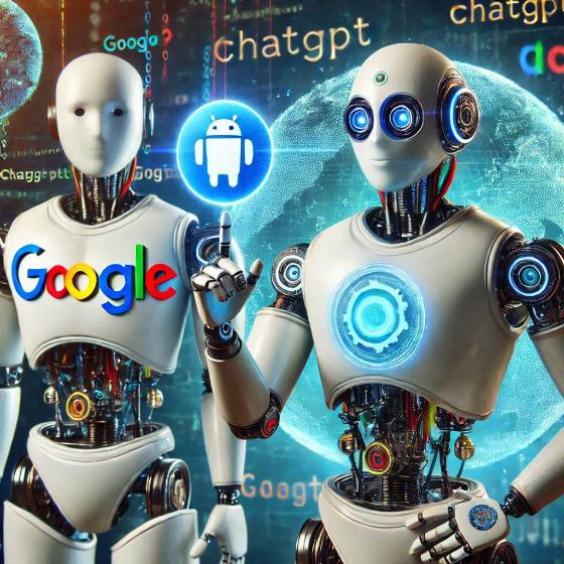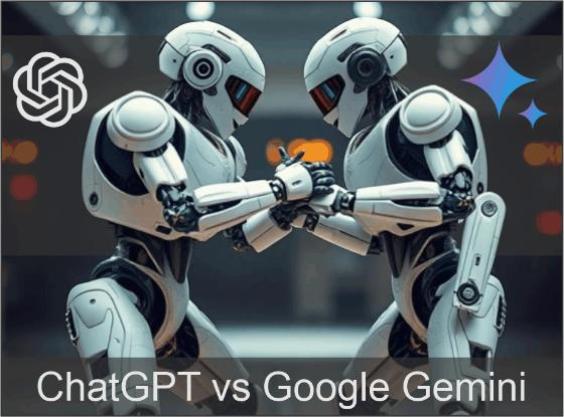ChatGPT vs Google Gemini
ChatGPT vs Google Gemini: The Battle of the Most Advanced Language Models
In recent years, language models have revolutionized the way we interact with technology. From virtual assistants to text generators, these models are present in many aspects of our lives. In this race to lead the market, two major contenders have emerged: ChatGPT from OpenAI and Google Gemini from Google. Both models have been designed to offer high-quality conversational experiences, but have notable differences that make them unique. In this article, we will compare both models in key aspects, such as their development, capabilities, and applications.

1. Origin and Development
ChatGPT was developed by OpenAI, an organization dedicated to research in artificial intelligence. The model is based on the GPT (Generative Pretrained Transformer) architecture, which is trained using large amounts of text available on the internet. The latest version of ChatGPT, known as GPT-4, is capable of understanding and generating text in a coherent, fluent, and contextually relevant manner. ChatGPT has gained popularity for its ability to adapt to a wide range of tasks, from writing articles to generating code or answering complex questions.
Google Gemini, on the other hand, is Google's response to OpenAI's advances in the field of language models. Gemini is the successor to Google's famous LaMDA series of models, designed to improve the conversational capabilities of virtual assistants. Google Gemini focuses on providing a more fluid and precise conversational experience, integrating Google's vast knowledge and advanced search capabilities.
2. Capabilities and Performance
Both models have impressive capabilities, but there are key differences in how they approach tasks.
ChatGPT:
- Text Generation: ChatGPT excels at generating long content, from articles to stories. Its ability to maintain coherence in extensive texts makes it a powerful tool for writers and content creators.
- Multimodality: With the incorporation of GPT-4, ChatGPT is capable of working with images, not just text, opening new possibilities for interacting with the model in a more visual way.
- Personalized Interaction: ChatGPT can adapt its responses according to the context, making it useful in applications that require more personalized human interaction.
Google Gemini:
- Search Precision: Since Gemini is deeply integrated with Google's search engine, its ability to obtain precise and relevant information in real time is one of its greatest strengths. This makes it an ideal tool for data queries or up-to-date facts.
- Advanced Contextualization: Google has implemented significant improvements in the way Gemini understands and processes queries, improving the precision and relevance of responses.
- Conversation Focus: Like ChatGPT, Google Gemini focuses on providing a natural conversational experience, but with a greater focus on web-based information and optimization for virtual assistants.
3. Applications and Uses
Both models are used in various applications, although their focus and scope of use may vary.
ChatGPT:
- Personal Assistants: ChatGPT is used in applications such as virtual assistants, where it can answer questions, perform tasks, and provide personalized assistance.
- Content Generation: From blogs to scripts, ChatGPT has become an essential tool for automated content creation, helping writers generate ideas, summaries, and complete texts.
- Education and Support: Thanks to its ability to answer complex questions, ChatGPT is used in the educational field to explain difficult concepts and provide personalized tutoring.
Google Gemini:
- Advanced Search: By being integrated with Google's search engine, Gemini is ideal for tasks that require obtaining up-to-date and precise information.
- Virtual Assistants: Similar to ChatGPT, Gemini is also used in devices such as Google Assistant, improving interaction with users through more natural and contextual responses.
- Data Analysis: Gemini has a strong focus on data analysis and interpretation of web-based queries, making it useful for research and analysis applications.
4. Key Differences in Interaction
One of the main differences between ChatGPT and Google Gemini is the way each model handles interaction.
ChatGPT tends to be more fluid and creative in its responses, making it suitable for tasks that require creativity, such as content writing, idea generation, and interacting in a more "human" way. However, its knowledge is limited by the data it was trained on and cannot access real-time information.
Google Gemini, on the other hand, has a significant advantage when it comes to accessing the most recent information, thanks to its integration with Google Search. While it also offers a conversational experience, its main strength is the ability to provide responses based on up-to-date facts and assisting in tasks that require information search.
5. Final Considerations
Both ChatGPT and Google Gemini are at the forefront of conversational artificial intelligence, but they are designed with different goals in mind. ChatGPT excels in creative text generation and personalized interaction, while Google Gemini stands out in precision and integration with Google's vast database, making it an excellent choice for search tasks and real-time information queries.
The choice between ChatGPT and Google Gemini depends on the specific needs of users. If you are looking for a virtual assistant for creative tasks or writing, ChatGPT may be your best option. If, on the other hand, you need quick and precise responses based on up-to-date information, Google Gemini might be more suitable.
Both models are driving the future of artificial intelligence, and it will be fascinating to see how they evolve in the coming years.






